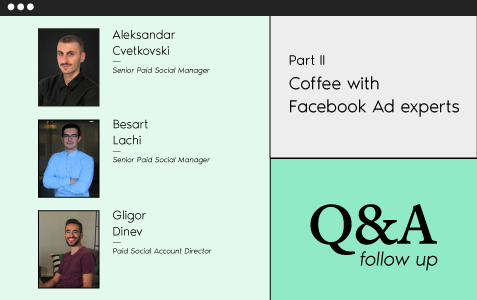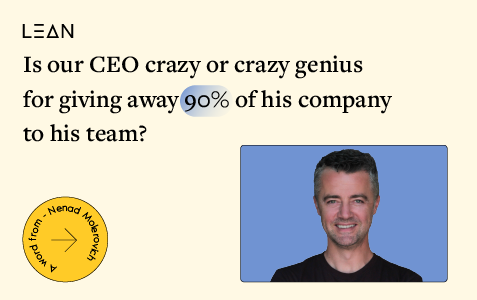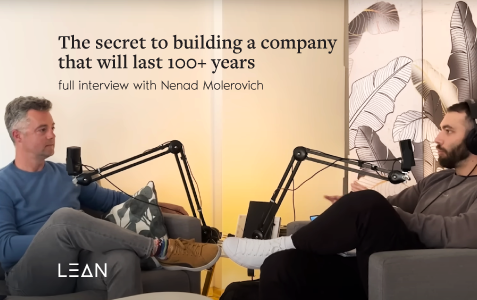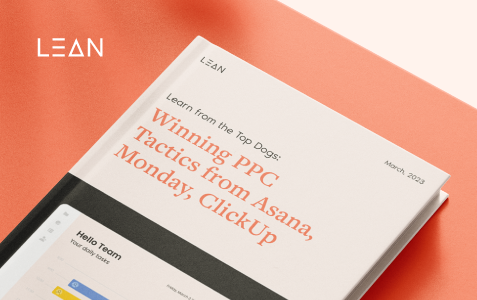We had a great time discussing Facebook ads on our last ‘Coffee with Experts’ event! Below you’ll find the second round of great questions and answers, and before you dive in – make sure you check out Part 1!
- What is the best action to take if the Frequency is too high? Do we need to decrease the budget or maybe expand the audience? Or maybe both?
Alex: Yes you can do both. You can decrease the budget and you can expand the audience pool. Another thing you can do is add more new ads.
Gligor: Also, have in mind that there’s no specific rule for what the Frequency should be. If the campaigns/ads are performing great, that’s what you should focus on. On the other hand, if you’re operating on a smaller market, the audience size is limited and you cannot simply expand it. For example, if you have a physical store and you’re only targeting Skopje or a part of Skopje, you need to have different ad concepts that you’ll test more frequently.
- We’re running a ‘Page Likes’ campaign on Facebook for a non-profit organization with a minimal budget. How do I measure success or how do I know if this campaign is successful?
Gligor: It depends. If you’re targeting Macedonian users you can see costs per page likes ranging anywhere from $0.1 to $1. It depends on the type of page, the ads and the formats. If you have some historical data, you can use that as your benchmark. If you want to lower the cost per page like, you need to change the ad or change the content on the page itself. You cannot know for sure the exact cost per page like. If the budget is very limited, you can try other things to get more page likes. But it definitely depends on the content. You can try Facebook groups or other communities and connect with that audience.
Andrej: It also depends on the auction. If there are a lot of similar pages that are competing for the same audience, the costs will be higher.
Alex: It also depends on the audience. If the audience is super-specific the CPM will be higher and therefore the costs will be higher as well. My tip is to go with a more broad audience.
- Is there a way to target the audiences of competitors? There’s no option to select Macedonian brands/pages in the Interest targeting section. Also, is it more important to target Interests or to have a great ad that will find the audience on its own?
Alex: Yes that’s true. You cannot target a specific brand if it’s not showing up as an option in the Interest targeting section.
Gligor: Other than that, there is this expensive tool called LeadEnforce that lets you target any Facebook page or group, but with all the iOS and data updates, I’m not sure if it’s the right thing to use. Another thing you can do – post a video from your page to a group where there are competitors’ clients/users and then create an audience from those video viewers that you can use for remarketing. And the third thing would be the actual audience research that you can do to find topics that those users are interested in, and use them as interests that you can target.
Besart: For the second part of this question, this is a very relevant topic these days. One of the things that the Facebook reps are saying, is that the algorithm is developed in way that the ad itself will be able to find the right audience. Based on that, Facebook will find the right audience using the ad copy/creative as a signal.
Andrej: What would you say is the effectiveness of these ‘Broad’ campaigns, compared to the Lookalikes or Interests?
Besart: For the cold (prospecting) audiences, If I can rank them by performance, the first place would be reserved for the Lookalike audiences, followed by the Broad and then the Interest based audiences. The Broad audiences are performing really well lately.
Alex: And ideally, you would exclude the Lookalike audiences form the Broad campaigns to avoid overlap.
- Which tools are you using for creating/launching Facebook and Instagram campaigns?
Alex: We don’t use any specific tools. All of the work is done in Facebook’s Ads Manager, where you can create and launch both Facebook and Instagram campaigns and ads. Also, there’s an option to add separate creatives for different placements, such as the Instagram Story placement. In 99% of the cases, it’s recommended to launch campaigns with the ‘Automatic Placements’ option, which means that the ads will be running on both platforms.
- What are your predictions for the future of Facebook/Instagram ads?
Andrej: In my opinion, everything will come down to having a great creative/ad. And this is the case for both Facebook and Google Ads. Other than that, it would be important to have a great business offer.
Alex: I totally agree. We know that Facebook is smart enough to find the right users using the ads, and the algorithm is getting smarter everyday.
Gligor: And not only that, but it will also get more expensive for advertisers. The CPMs will go up and if you want to get to more users with less budget, you’ll need to re-think the creative/ad.
- A little bit out of topic, but what’s the best way to distribute content on Facebook?
Gligor: Before you distribute any content, make sure that the content itself is great. It depends on the content and the niche, but I would start with creating a content strategy, making sure that your Facebook/Instagram page and website are ready to go and ready to be seen by other users. In terms of formats, Facebook is heavily focused on giving more space to videos, especially longer and engaging ones with great content that will keep the user watching.
Another thing you can do is distribute the content in multiple formats, for example, let’s say you have an article on the website, you can use that to create a video for the article, one image or multiple images, a carousel etc. Then you can find relevant groups and post it there. If there aren’t any relevant groups, you can start creating your own community and promote the content there. And don’t just focus on Facebook, you can find great groups/communities on LinkedIn or YouTube as well. Try to connect and collaborate with the people there.
- Another question regarding the distribution of the content: For example, you’ll create an article with great content and then you post it in a group. Why would I click on it if I’m only seeing the headline or one line from the article?
Gligor: When I’m talking about great content, I’m also talking about having a great ‘hook’, headline and copy to promote that content. I’m not just talking about the content in the article itself. Want it or not, you need to think about the other side as well, which is creating an attention grabbing creative/copy to try and convince users to click on it and get to your website.
- Is it better to go with a more educational/informative content or content that’s with a more ‘personal touch’ when thinking about Facebook ads?
Alex: It depends on your goals and on the audience, or to be more precise – in which stage of the funnel those users are. Because you’ll find that the content that’s performing well for prospecting audiences, is not the same content that’s performing well for remarketing audiences for example. You need to think about your business and your users and test out different types of content/ads for the different stages of the funnel.
- What’s the optimal number of Interests to target in a campaign?
Besart: There’s no ‘optimal’ number of Interests to target in one Ad Set, but the recommendation from the Facebook representatives is to use more Interests in one Ad Set, grouped by a specific theme. For example, if you’re targeting the ‘Outdoors’ theme/category, you can have multiple relevant Interests in one Ad Set, such as ‘Hiking’, ‘Climbing’ etc. But again, you can also test the other approach, where you have one Interest per ad set, and see what works best for you.
Gligor: I would start off with testing one Interest per Ad Set and find out which specific Interest is performing better. Then, when you find multiple winners, you can add them in one Ad Set and scale from there.
Alex: I would also add that you can have a separate ‘experimental’ campaign with smaller budget for testing Interests, and when you have the winners you can just add them in your ‘Core’ campaign.
- What’s the ‘redline’ in terms of time when it comes to testing ads for your clients?
Besart: For the experiments and the ‘experimental’ campaign we try not to spend more than 20% of the monthly budget, and we try to leave the tests running for at least a week before making any conclusions. But have in mind that we’re running different experiments all the time.
Gligor: And it also depends on the budget. If you’re spending $10K per day, you need to monitor all tests more frequently as you can have insights in 3 days for example.
- What sort of data is Facebook collecting with the Facebook Pixel?
Alex: Let’s take an e-commerce websites as an example. The events from the Facebook Pixel that we as advertisers can track are: Website Visits, View Content (if the users spends more time on the website going trough different products for example), Add To Cart (users adding to their shopping cart), Checkouts, Purchases. The Pixel also tracks the time spent on the site or the frequency of the visits, and we can target audiences based on that as well.
Besart: And let’s not forget the iOS update. All of this that Alex mentioned is valid for now, but we expect changes with the new iOS update. Some of these changes will include tracking only up to 8 conversion events. This is a bit complicated so you can check out our article on this subject: How Apple’s iOS 14 release may affect your ads – And how to prepare for it?
- Which elements should a great landing page include?
Andrej: It’s important for the landing page to be able to focus the user on the one thing that we want to achieve (the goal or the action that we want the user to take). In some cases we can have 2 things (or actions) that we want the user to choose from, but we need to minimize or get rid of all the other distractions on the page. If you’re familiar with Google’s quality score, the landing page is actually one of the elements that goes into evaluating this score. We also need to have a highlighted CTA (call-to-action) button or a form above the fold, and we need to be clear on our offer and set the right expectation for the user.
The rest of the landing page content will depend on the industry and the audience. Sometimes we need a short landing page but in other cases we need longer landing pages (with testimonials, other content, reviews etc.).
- Predictions about performance marketing and a shift of the mindset
Nenad: Listening to the discussion and all the great points being made, I would briefly want to discuss the future of PPC and performance marketing. The way we think and operate now in terms of performance marketing, will change, and this will be mostly because of the progress in AI and machine learning. I don’t know if you’ve seen my AllWeb talk, but long story short, in that video I’m talking about this concept called ‘truth seeking’. What’s important to understand is that, if the creative/ad is the single most important thing (and if the creative/ad finds the right audience), then what you need to figure out is ‘when’ and ‘how’ does the machine chooses the winning ad(s). You need to find and set a logical methodology that will get you to the next hypothesis and the next ad concepts that you need to test out.
To simplify, the question for us marketeers is – “What’s the hypothesis for the next ad and why?”. And this ‘machine learning’ progress is happening in the past 7-8 years, and some brands from specific industries had great results using the ‘automatic’ strategy/bidding with Google Ads for example. So this only shows that the machine is capable of learning more and more about the user, so things such as structure, audience targeting, bidding etc., will be less and less important. Knowing all of this, the greatest impact that you can have on the results is by knowing how to get to the next hypothesis for testing ads.
All in all, the ‘marketing’ part of the puzzle should come out more from us, ‘performance marketeers’. We’ll need to focus more on the users and their behavior and understand how we should position our offer in the most relatable way possible.
_____________________________________________________________________________
If you like this type of content and you want to find out even more, we’d be happy to have you in our Facebook Group PPC Addicts, where we discuss PPC and Digital Marketing experiments, experiences and news.





